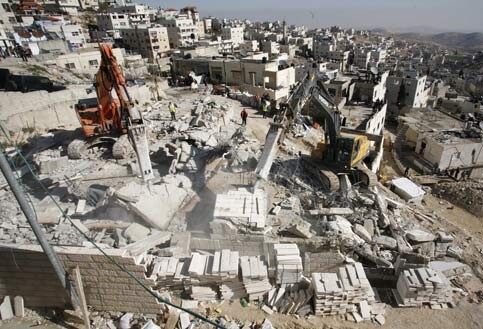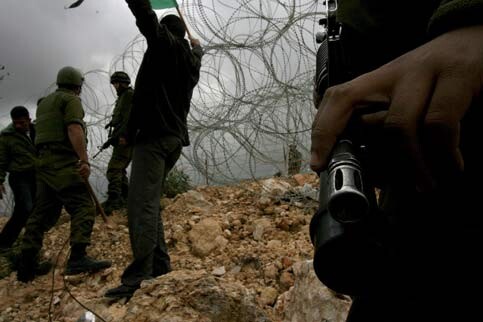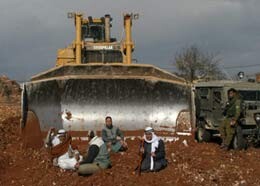Palestinian Center for Human Rights 28 December 2006

Israeli bulldozers demolish a Palestinian house in the village of Issawiya, on the edge of Jerusalem, December 25, 2006. According to the Israeli authorities, the house was demolished due to lack of permits. (MaanImages/Moamar Awad)
Israeli Occupation Forces (IOF) Continue Systematic Attacks on Palestinian Civilians and Property in the Occupied Palestinian Territory (OPT)
A Palestinian civilian died from a previous wound in the Gaza Strip.
4 Palestinian civilians, including two children, were wounded by IOF.
IOF conducted 22 incursions into Palestinian communities in the West Bank.
IOF arrested 37 Palestinian civilians, including 6 children.
IOF have continued to impose a total siege on the OPT; IOF have isolated the Gaza Strip from the outside world and IOF positioned at various checkpoints in the West Bank arrested 3 Palestinian civilians.
IOF have continued to construct the Annexation Wall inside the West Bank; IOF razed areas of Palestinian land in Um Salamouna village, south of Bethlehem, and 4 demonstrators protesting the construction of the Wall in Bal’ein village, west of Ramallah, sustained bruises when IOF soldiers beat them.
IOF have continued settlement activities in the West Bank; the Israeli government approved the construction of 30 housing units in “Mashkhit” settlement to resettle 30 Israeli families from the evacuated “Gush Qatif” settlement bloc.
Summary
Israeli violations of international law and humanitarian law continued in the OPT during the reporting period (21 - 27 December 2006):
Killing: On Thursday morning, 21 December 2006, Hamdan Mahmoud Barhoum, 24, from al-Mawasai area in Khan Yunis, died from a wound he had sustained on 13 December 2006. According to PCHR’s documentation, Barhoum was seriously wounded by shrapnel from live bullets throughout the body, when IOF gunboats positioned opposite to Rafah seashore opened fire at a fishing boat on which Barhoum and two other fishermen were sailing. The three fishermen were wounded, but Barhoum was in a serious condition.
During the reporting period, a Palestinian farmer was wounded by the IOF gunfire in the northern Gaza Strip.
In the West Bank, 3 Palestinian civilians, including two children, were wounded in Qabatya village, southeast of Jenin, on 25 December 2006, when IOF soldiers who besieged a house in the village fired at civilians who threw stones at military vehicles.

Israeli soldiers scuffle with Palestinian and international activists during a demonstration against Israel’s separation wall in the village of Bilin, near the West Bank town of Ramallah, December 22. 2006. (MaanImages/Moti Milrod)
Incursions: During the reporting period, IOF conducted at least 22 military incursions into Palestinian communities in the West Bank, during which they raided houses and arrested 37 Palestinian civilians, including 6 children. IOF also raided offices of the Islamic Association in Beit Sahour town and a medical center in Beit ‘Awa village, southwest of Hebron, claiming that they were looking for wanted Palestinians.
Restrictions on Movement: IOF have continued to impose a tightened siege on the OPT and imposed severe restrictions on the movement of Palestinian civilians in the Gaza Strip and the West Bank, including occupied East Jerusalem.
Gaza Strip
IOF have imposed a strict siege on the Gaza Strip. They have closed its border crossings as a form of collective punishment against Palestinian civilians.
IOF have closed Rafah International Crossing Point since 25 June 2006, even though they do not directly control it. During the reporting period, the crossing point was not opened. IOF have partially reopened commercial crossings, especially al-Mentar (Karni) crossing, but many goods and medical supplies have been lacked in markets in the Gaza Strip. IOF have also continued to close Erez crossing in the northern Gaza Strip. Hundreds of thousands of Palestinians from the Gaza Strip have been prevented from traveling through this crossing. IOF have allowed international workers to pass through the crossing. With this closure, only few Palestinian patients have been able to travel to hospitals in Israel and the West Bank. In addition, IOF have continued to prevent Palestinian fishermen from fishing for nearly 6 months.
West Bank

Israeli military bulldozers continue to destroy land and uproot Palestinians. (PCHR)
Annexation Wall: IOF have continued to construct the Annexation Wall inside the West Bank. On 26 December 2006, IOF started to raze areas of Palestinian land in Um Salamouna village, south of Bethlehem, to construct a section of the Wall. It is worth noting that on 3 September 2006, IOF issued a military order seizing 152 donums[1] of land in Um Salmouna village to be used for “military purposes to establish a fence and a number of secure roads.” During the reporting period, IOF used force against Palestinian civilians and international and Israeli solidarity activists who demonstrated in protest to the construction of the Wall in Bal’ein village, west of Ramallah. Four demonstrators sustained bruises.
Illegal Settler Activities: On 26 December 2006, IOF started to place barbwires along a settler road that passes through Jenata village, southeast of Bethlehem. According to local sources, IOF closed the areas located near the road and started to place barbwires along it. During the reporting period, Israeli media sources reported the Israeli Defense Ministry approved the resettlement of Israeli families evacuated from the “Gush Qatif” settlement bloc in the Gaza Strip in 2005 in a deserted settlement in the northern Jordan Valley on the Palestinian side of the Annexation Wall. According to those sources, the ministry approved the construction of 30 housing unit in the settlement, which is known as “Mashkhit”, and 30 Israeli families evacuated from the “Gush Qatif” settlement bloc would be settled in those units. Furthermore, the Israeli Attorney-General declared that he would initiate a criminal investigation into the construction of settlements on private Palestinian land. This declaration came in response to a demand by the Israeli Peace Now to conduct a criminal investigation into the robbery private Palestinian land to build settlement. According to Peace Now, private Palestinian land accounts for 40% of land used for Israeli settlements in the West Bank.
The outcome of crimes committed by IOF since 25 June 2006:
Israeli Violations Documented during the Reporting Period (21 - 27 December 2006)
1. Incursions into Palestinian Areas and Attacks on Palestinian Civilians and Property in the West Bank and the Gaza Strip
Thursday, 21 December 2006
Friday, 22 December 2006
1. Mohammed Jamal Khalil, 15;
2. ‘Omar Isma’il Khalil, 16;
3. Hamza Ameen Khalil, 16; and
4. Ayoub ‘Abed Khalil, 16.
Sunday, 24 December 2006
Monday, 25 December 2006
1. Ra’ed Samer al-Sirreesi, 15;
2. Ahmed Mahmoud ‘Awada, 20; and
3. Ashraf al-Beitar, 19.
1. Mahmoud Ahmed al-Shayeb Saba’na, 22, seriously wounded by a live bullet to the neck;
2. Mohammed Joma’a Abu al-Rub, 15, wounded by a live bullet to the foot; and
3. Ahmed Tayseer Tazaz’a, 15, wounded by shrapnel to the head.
Before their withdrawal from the village at 15:30, IOF arrested 9 Palestinians, including two brothers and a man and his two sons:
1. Mohammed Hamza Abu al-Rub, 22;
2. Mahmoud Ahmed Kmayel, 21;
3. Mohammed ‘Adnan Kmayel, 20;
4. Nabeel ‘Adnan Kmayel, 22;
5. Yasser Ameen Nazzal, 47, an intelligence officer;
6. Nidal Sa’id Salama, 55, an officer of the Palestinian National Security Forces;
7. Mujahed Nidal Salama, 19;
8. ‘Allan Nidal Salama, 22; and
9. Diaa’ Ibrahim Saba’na, 20, a police officer.
Tuesday, 26 December 2006
1. Trad ‘Othman Abu ‘Arram, 30; and
2. Fadel Mohammed Abu ‘Arram, 35.
Wednesday, 27 December 2006
1. Kamal ‘Omar Ibrahim, 20; and
2. Mohammed Ahmed Waked, 19.
1. Khalil Sameer Abu Ja’sa, 20;
2. Mohammed Kamel ‘Abdul Haq, 22;
3. Mohammed Khalbous, 18; and
4. Ahmed Abu Salha, 22.
1. Mo’ayad Burhan al-Muhtasseb, 22;
2. Mohammed Ahmed Fannouna, 39; and
3. Anas As’ad Laban, 26.
2. Continued Siege on the OPT
IOF have continued to impose a tightened siege on the OPT and imposed severe restrictions on the movement of Palestinian civilians in the Gaza Strip and the West Bank, including Occupied East Jerusalem.
Gaza Strip
IOF have continued to close all border crossings of the Gaza Strip. During the reporting period, these crossings were partially reopened to allow the entry of basic foodstuffs, medical supplies and other necessities into the Gaza Strip. The total siege imposed by IOF on the Gaza Strip has left disastrous impacts on the humanitarian situation and has violated the economic and social rights of the Palestinian civilian population, particularly the rights to appropriate living conditions, health and education. It has also paralyzed most economic sectors. Furthermore, severe restrictions have been imposed on the movement of the Palestinian civilian population.
On 15 November 2006, the Palestinian - Israeli agreement on border crossing, which was concluded under US and European supervision, expired. Under this agreement, IOF have maintained indirect control over of the crossing point. The European observation team working at the crossing point extended their task for additional 6 months. On 15 November 2005, the Palestinian National Authority (PNA) and Israel reached an agreement over the border crossings of the Gaza Strip. Under the agreement, on 25 November 2005, the Rafah International Crossing Point, on the Egyptian border in the south of the Gaza Strip, was opened for civilian travel to Egypt and the rest of the world. The Palestinians and European Union (EU) observers would run the Palestinian side of the crossing point. In addition, the EU observers would transmit live images to a joint control room several kilometers away. The EU observers repeated withdrew from the crossing following receiving warnings from IOF that there were threats to them. However, all warnings proved to be void, and the observers resumed their work.
The closure of border crossings deprives the Palestinian civilian population in the Gaza Strip of their right to freedom of movement, education and health.
IOF have continued to impose severe restrictions on fishing in the Gaza Strip. Following the attack on IOF on 25 June 2006, IOF prevented fishing. Approximately 35,000 people in and around Gaza’s coastal communities rely on the fishing industry, including 2,500 fishermen, 2,500 support staff and their families. Fishermen have been subjected to intensive monitoring by IOF, which use helicopter gunships and gunboats to monitor the fishermen. The Oslo Accords allow Palestinian fishermen to go fishing up to 20 nautical miles away from the Gaza seashore.
The West Bank

Israeli bulldozer demolishing Palestinian farmland to make space for the annexation wall in the West Bank village of Wadi Al-Nees near Bethlehem, December 26, 2006. (MaanImages/Mamoun Wazwaz)
IOF have imposed a tightened siege on the West Bank. They have continued to impose severe restrictions on the movement of Palestinian civilians and imposed curfews on a number of Palestinian communities.
On Thursday noon, 21 December 2006, IOF soldiers permanently positioned in the center and south of Hebron arrested two Palestinian civilians: Isma’il ‘Awad al-Khatib, 22; and Ra’ef Mohammed al-Najjar, 26.
On the same day evening, IOF soldiers positioned in the south of Hebron arrested Ussama ‘Abdul Rahim al-Muhtasseb, 21.
3. Construction of the Annexation Wall
IOF have continued to construct the Annexation Wall inside West Bank territory.
4. Settlement Activities and Attacks by Settlers against Palestinian Civilians and Property
Recommendations to the International Community
- PCHR calls upon the High Contracting Parties to the Fourth Geneva Convention to fulfill their legal and moral obligations under Article 1 of the Convention to ensure Israel’s respect for the Convention in the Occupied Palestinian Territory. PCHR believes that the conspiracy of silence practiced by the international community has encouraged Israel to act as if it is above the law and encourages Israel continue to violate international human rights and humanitarian law.
- PCHR calls upon the High Contracting Parties to the Fourth Geneva Convention to convene a conference to take effective steps to ensure Israel’s respect of the Convention in the OPT and to provide immediate protection for Palestinian civilians.
- PCHR calls upon the High Contracting Parties to the Fourth Geneva Convention to comply with its legal obligations detailed in Article 146 of the Convention to search for and prosecute those responsible for grave breaches, namely war crimes.
- PCHR recommends international civil society organizations, including human rights organizations, bar associations and NGOs to participate in the process of exposing those accused of grave breaches of international law and to urge their governments to bring these people to justice.
- PCHR calls upon the European Union to activate Article 2 of the Euro-Israel Association Agreement, which provides that Israel must respect human rights as a precondition for economic cooperation between the EU states and Israel. PCHR further calls upon the EU states to prohibit import of goods produced in illegal Israeli settlements in the OPT.
- PCHR calls upon the member States of the EU, and all other states, to adopt a voting pattern at the UN bodies, particularly the General Assembly, Security Council and Commission on Human Rights which is keeping with international law.
- PCHR demands that the International Court of Justice Advisory Opinion be immediately implemented by the international community.
- PCHR calls on the international community to recognize the Gaza disengagement plan, which was implemented last year, for what it is - not an end to occupation but a compounding of the occupation and the humanitarian crisis in the Gaza Strip.
- In recognition of ICRC as the guardian of the Fourth Geneva Convention, PCHR calls upon the ICRC to increase its staff and activities in the OPT, including the facilitation of family visitations to Palestinian prisoners in Israeli jails.
- PCHR appreciates the efforts of international civil society, including human rights organizations, bar associations, unions and NGOs, and urges them to continue their role in pressuring their governments to secure Israel’s respect for human rights in the OPT and to end its attacks on Palestinian civilians.
- In light of the severe restrictions imposed by the Israeli government and its occupying forces on access for international organizations to the OPT, PCHR calls upon European countries to deal with Israeli citizens in a similar manner.
- PCHR reiterates that any political settlement not based on international human rights law and humanitarian law cannot lead to a peaceful and just solution of the Palestinian question. Rather, such an arrangement can only lead to further suffering and instability in the region. Any peace agreement or process must be based on respect for international law, including international human rights and humanitarian law.
The Palestinian Centre for Human Rights (PCHR) is an independent legal body based in Gaza City dedicated to protecting human rights, promoting the rule of law and upholding democratic principles in the Occupied Palestinian Territory. It holds Special Consultative Status with the Economic and Social Council (ECOSOC) of the United Nations and is an affiliate of the International Commission of Jurists, the Federation Internationale des Ligues des Droits de l’Homme (FIDH), and the Euro-Mediterranean Human Rights Network. PCHR is a recipient of the 1996 French Republic Award for Human Rights.
Related Links